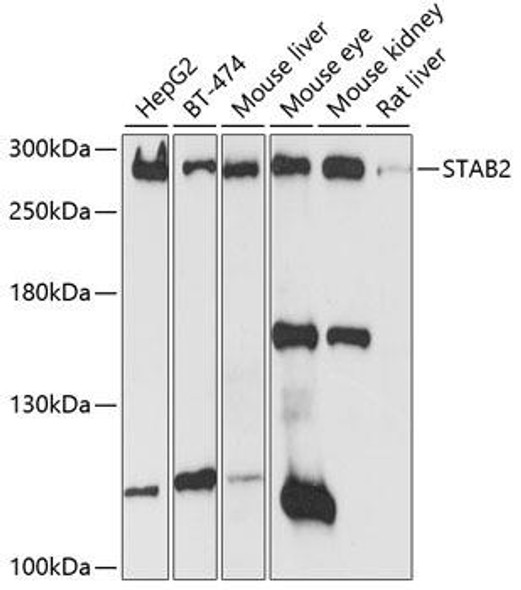Anti-PCNT Antibody (CAB20161)
- SKU:
- CAB20161
- Product type:
- Antibody
- Antibody Type:
- Polyclonal Antibody
- Reactivity:
- Human
- Rat
- Host Species:
- Rabbit
- Isotype:
- IgG
- Synonyms:
- KEN
- PCN
- MOPD2
- PCNT2
- PCNTB
- PCTN2
- SCKL4
Frequently bought together:
Description
| Product Name: | PCNT Rabbit pAb |
| Product Code: | CAB20161 |
| Size: | 50uL, 100uL |
| Synonyms: | KEN, PCN, MOPD2, PCNT2, PCNTB, PCTN2, SCKL4 |
| Applications: | WB, IF |
| Reactivity: | Human, Rat |
| Host Species: | Rabbit |
| Immunogen: | Recombinant protein of human PCNT. |
| Applications: | WB, IF |
| Recommended Dilutions: | WB 1:1000 - 1:2000 IF 1:50 - 1:200 |
| Reactivity: | Human, Rat |
| Positive Samples: | SH-SY5Y, Rat heart |
| Immunogen: | Recombinant protein of human PCNT. |
| Purification Method: | Affinity purification |
| Storage: | Store at -20°C. Avoid freeze / thaw cycles. Buffer: PBS with 0.02% sodium azide, 50% glycerol, pH7.3. |
| Isotype: | IgG |
| Sequence: | Email for sequence |
| Gene ID: | 5116 |
| Uniprot: | O95613 |
| Calculated MW: | 378kDa |
| Observed MW: | 251KDa/378KDa |
| UniProt Protein Function: | PCNT: Integral component of the filamentous matrix of the centrosome involved in the initial establishment of organized microtubule arrays in both mitosis and meiosis. Plays a role, together with DISC1, in the microtubule network formation. Is an integral component of the pericentriolar material (PCM). May play an important role in preventing premature centrosome splitting during interphase by inhibiting NEK2 kinase activity at the centrosome. Defects in PCNT are the cause of microcephalic osteodysplastic primordial dwarfism type 2 (MOPD2); also known as osteodysplastic primordial dwarfism type 2. Adults with this rare inherited condition have an average height of 100 centimeters and a brain size comparable to that of a 3-month-old baby, but are of near-normal intelligence. 2 isoforms of the human protein are produced by alternative splicing.Protein type: Cell cycle regulationChromosomal Location of Human Ortholog: 21q22.3Cellular Component: centriole; microtubule; centrosome; pericentriolar material; intercellular bridge; membrane; cytoplasm; cytosolMolecular Function: calmodulin binding; protein bindingBiological Process: in utero embryonic development; multicellular organism growth; organelle organization and biogenesis; olfactory bulb development; neuron migration; microtubule cytoskeleton organization and biogenesis; spindle organization and biogenesis; limb morphogenesis; cerebellar cortex morphogenesis; brain morphogenesis; cilium biogenesis; mitotic cell cycle; G2/M transition of mitotic cell cycle; negative regulation of apoptosisDisease: Microcephalic Osteodysplastic Primordial Dwarfism, Type Ii |
| UniProt Protein Details: | |
| NCBI Summary: | The protein encoded by this gene binds to calmodulin and is expressed in the centrosome. It is an integral component of the pericentriolar material (PCM). The protein contains a series of coiled-coil domains and a highly conserved PCM targeting motif called the PACT domain near its C-terminus. The protein interacts with the microtubule nucleation component gamma-tubulin and is likely important to normal functioning of the centrosomes, cytoskeleton, and cell-cycle progression. Mutations in this gene cause Seckel syndrome-4 and microcephalic osteodysplastic primordial dwarfism type II. [provided by RefSeq, Jul 2008] |
| UniProt Code: | O95613 |
| NCBI GenInfo Identifier: | 81295809 |
| NCBI Gene ID: | 5116 |
| NCBI Accession: | NP_006022.3 |
| UniProt Secondary Accession: | O95613,O43152, Q7Z7C9 |
| UniProt Related Accession: | O95613 |
| Molecular Weight: | |
| NCBI Full Name: | pericentrin |
| NCBI Synonym Full Names: | pericentrin |
| NCBI Official Symbol: | PCNT |
| NCBI Official Synonym Symbols: | KEN; PCN; MOPD2; PCNT2; PCNTB; PCTN2; SCKL4 |
| NCBI Protein Information: | pericentrin; kendrin; pericentrin-2; pericentrin-B; pericentrin-380 |
| UniProt Protein Name: | Pericentrin |
| UniProt Synonym Protein Names: | Kendrin; Pericentrin-B |
| Protein Family: | Pericentrin |
| UniProt Gene Name: | PCNT |
| UniProt Entry Name: | PCNT_HUMAN |







